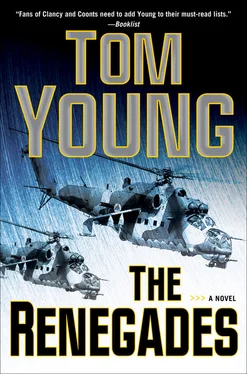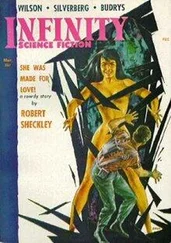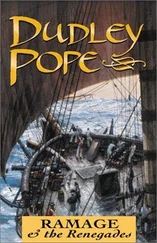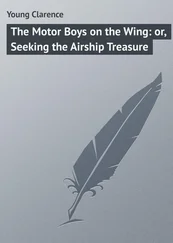To Gold’s relief, Aamir had not appeared in a prison jumpsuit and shackles. He wore the same sweat-stained flight suit he’d had on last night. She didn’t know what authority had decided that, but she considered it a good call. If they treated him like a military officer and crime victim instead of a perpetrator, maybe he’d act like an officer and help out. He had to face a reckoning for what he’d done, but that could wait.
Parson, Rashid, and an OSI agent stood by. “Has he ever seen this Chaaku guy before?” the OSI agent asked.
Gold felt sure Aamir had not, but she interpreted the question anyway.
“Never,” Aamir answered in Pashto. “I never heard of this monster until today.”
After Gold repeated the answer in English, the OSI man asked, “When did his boy go missing?”
More translation. “A little more than a month ago,” Aamir said.
So the abduction had happened before the earthquake, Gold noted. Had Black Crescent been abducting kids for weeks now? If so, they might have used the natural disaster as a way to step up what they’d planned all along.
“Ask him what happened the day the kid was abducted,” the OSI agent said.
Gold apologized in Pashto for having to ask the question, but Aamir cut her off.
“I do not deserve your respect,” he said. “You may ask me anything in any way.”
“You faced awful choices, Lieutenant,” Gold said. “We understand that.”
Aamir showed no reaction to Gold’s remark, but went right to the question. “My son, Hakim, went to school that morning in Jalalabad as always,” he said. “I was on the other side of the country, flying at Shindand Air Base. When I landed, there was a message from my wife saying Hakim had not returned home. By the time I reached her by telephone, she had received a shabnamah .”
Gold explained in English that a shabnamah was a “night letter,” a warning from terrorists. The letter told Aamir not to call the police, and instructed him to fly to a certain set of coordinates as soon as he had a mission with an American officer on board.
“So they did not seek Lieutenant Colonel Parson by name?” Gold asked.
“No,” Aamir said, “they wanted any American. But they said the higher the American’s rank, the more likely I would see my son again.”
“What were they going to do with the rest of the crew?” Gold asked.
Aamir did not speak for a moment. “They did not say,” he said finally. His lips began to tremble, and the color went out of his face. He looked over at Parson and Rashid. Rashid stared at him without any apparent emotion. Aamir lowered his gaze to the floor. “I am sure the crew would have been executed,” he said. “Me, too, most likely. But I saw no other choice. By now, they have probably killed Hakim.”
Gold translated everything Aamir had said while the OSI agent took notes. “I guess we need to show him the latest video,” the agent said, “the one with the kids in it. Do you think he’ll fall apart if he sees his son?”
“I don’t know, sir,” Gold said. “He thinks his son might be dead.”
Rashid spoke up in Pashto. Evidently he’d followed the conversation in English well enough, but he had thoughts he could express best in his own language. Or maybe he just wanted Aamir to hear them straight from him. “I care not if the video makes him fall apart,” Rashid said. “He must help.”
“Captain, please—” Gold said.
“You are right, sir,” Aamir said. “Show me this cursed video.”
Gold nodded, and the OSI agent leaned over, clicked the mouse. The image came up on-screen. Before Chaaku even began speaking, Aamir slid from his chair and fell to his knees.
First he cried out in a moan of anguish that formed no words. Then, with his head on the floor, he shouted, “That is him! That is Hakim!”
Now even Rashid seemed moved. He placed his hand on his copilot’s shoulder and said, “Tell us which one, Lieutenant. Show us your son.”
Aamir sat up, coughed, wiped his eyes and face with the sleeve of his flight suit. He pointed to the computer and said, “To the immediate left of that monster. Dear God, they have placed upon him the head scarf of a martyr.”
With another mouse click, the OSI agent paused the video. Gold looked closely at the boy beside Chaaku. He held an AK-47 with the magazine removed. His face bore no expression. The boy’s resemblance to his father became clear now that Gold knew who he was. Hakim had that same penetrating gaze, something about the set of the eyes. In the video, he was looking at something offscreen. Probably an adult pointing a loaded rifle, Gold supposed.
“When was this made?” Aamir asked.
“Within the last week,” Gold said. She had translated none of his last few words into English, but she didn’t need to. It would have been obvious to Parson and the OSI agent that Aamir had identified his son.
“They will put a suicide vest on him and send him to his death,” Aamir said. He began to wail again.
Rashid placed his hand on Aamir’s back and said, “Allah is merciful, Lieutenant. He hears your cries.”
God is merciful, but people are not, Gold thought. She could hardly imagine Aamir’s pain, and she could hardly imagine a good end to this. And what of Fatima’s brother, Mohammed?
“Is it not enough for my son just to be killed?” Aamir asked. “Must he die a murderer? Must he suffer?”
No words Gold knew could offer a decent answer to that question. So maybe she could get him to focus on other questions, more ways he could contribute. One thing she’d learned in her years of working with men: In bad situations, they felt better if they thought they had some control. If they faced a problem, you needed to give them something to do about it, no matter how insignificant. If they could do little to help, let them believe they were helping. Nearly all men shared that trait, whether they were American or Afghan, flyboys or ground-pounders. She couldn’t give Aamir unrealistic hope, but she could get him to focus.
“Lieutenant Aamir,” she said, “I know this is difficult, and I will not lie about the gravity of your son’s circumstances. But you might be able to help him if we look at some things on a map.”
“Anything,” he said. “Please tell me anything I can do.”
“Let us look at where those coordinates were, and where your helicopter went down.”
“Yes, yes. Right away. I want a chart. Where are some aeronautical charts?”
In English, Gold explained what she was doing.
“Good job,” Parson said. “I was going to ask him to do that anyway. Let me get a TPC.”
Parson went into the flight planning room and came back with a Tactical Pilotage Chart. Gold didn’t understand all the different kinds of aviators’ maps, but she’d gathered that the white ones with a bunch of lines and circles were for flying on instruments. The colorful ones that depicted terrain were for visual flying. This map had color—mountains and valleys and streams.
Parson spread the chart across a table. He took a pencil from the pen pocket on the left sleeve of his flight suit, marked a spot on the chart.
“This is where we went down,” Parson said. “Now, where was he trying to go?”
Gold asked the question in Pashto. With the pencil between his thumb and forefinger, Parson held it toward Aamir. The Afghan flier took the pencil and marked another location. As he looked up from the chart, he locked eyes with Parson. To Gold’s relief, Parson did not seem angry or even surprised. He just took back the pencil and placed it in his sleeve. Judging from the scale reference on the chart, only a few miles of ground separated the two points. No wonder the insurgents had seen the Mi-17 go down and had attacked so quickly.
Читать дальше












